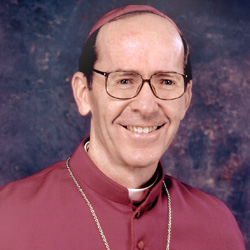Editor’s note: This is an ongoing series of articles exploring the new English-language translation of the Roman Missal, which the Church will begin using Nov. 27. This article orginally appeared in the September 2011 edition of Columbia.
When we begin to use the new English translation of the Mass in Advent of this year, we shall notice a few changes in the wording of the prayer that we call the Nicene Creed. These changes are not many but they are significant.
For example, the first word will not be “we” but “I.” “I believe in one God…” And throughout the Creed, wherever previously we have said “we believe” or “we confess” or “we look forward,” we shall say “I…” Why the change? First of all, it is a more accurate translation of the Latin text: the Latin word “credo” which literally means “I believe.” While it is true that, at Mass, we profess the creed together with other believers, and thus the former translation is not heretical, the singular pronoun emphasizes a key aspect of faith, namely that it is a deeply personal decision in response to a wondrous gift from God. No one else can make this decision for us. Each person chooses whether or not he will entrust himself to God. As Josef Pieper says, “Belief can never be half-hearted.” Faith rests on an act of the will. Throughout the Creed, then, the word “I” will be used in place of “we” to express this profoundly personal decision of each one present at Mass.
At the same time, at Mass God mysteriously raises each person’s freely offered “I believe” into the “I” of Jesus Christ. At this moment I discover my own “I” is not alone and forgotten among a scattered and wandering sea of individuals, but rather in union with the living Body of Christ, the Church, which forms the one new “I” of faith in the Body of the Risen Jesus.
Another word that will stand out in the new translation of the Creed is “consubstantial” in place of “one in being.” Both translations point towards the same reality that the Church defended and defined nearly 1700 years ago. The Catechism of the Catholic Church explains (#465), “The first ecumenical council of Nicaea in 325 confessed in its Creed that the Son of God is ‘begotten, not made, of the same substance (homoousios in Greek) as the Father’.” The new translation reflects the desire of the Church to point to the precise meaning of her doctrine regarding the Son: that He is a divine person with the exact same divine nature (or substance) as God. It more clearly links us, theologically and linguistically, with the Creed as professed in Latin and Greek for seventeen centuries.
A third change that you will notice is linked to the role of Mary in the life of Christ. Instead of saying that Jesus “was born” of the Virgin Mary, we will now say that He “was incarnate” of her. At first glance, it may seem that the Church is just asking you to use an archaic word in place of a familiar one. But what is at stake here is much more consequential than that. Jesus was not just “born of the Virgin Mary,” He “was born of the Father before all ages.” He is the only Begotten Son of God; and at the moment of Mary’s “Fiat” in response to the Angel Gabriel, He took on human flesh through her free cooperation; that is, he became incarnate, quite independent of the moment He was born. As the Catechism explains (#461), “…the Church calls ‘Incarnation’ the fact that the Son of God assumed a human nature in order to accomplish our salvation in it.” The Catechism goes on to teach (#463), “Belief in the true Incarnation of the Son of God is the distinctive sign of Christian faith.”
Another change that you will notice is the replacement of the phrase “suffered, died and was buried,” with “suffered death and was buried.” The change in emphasis here is subtle but important. Recall the words of St. Peter (I Pet 2:21), “Christ also suffered for you, leaving you an example that you should follow in His footsteps.” The greatest suffering for human beings is death. In becoming incarnate, Jesus entered into the depths of all human experience, even death itself. By suffering death on the Cross and rising again in glory, He conquered death and restored life. He also conquered the devil “who has the power of death (Heb 2:14).” In addition, He opened the way for all to eternal life.
Faith in God is a pearl of great price, a precious treasure for which it is worth sacrificing all else to obtain. When we profess our divine faith together, as we do in reciting the Creed, we express what unites us as one. The few but significant changes of the new English translation will help us to do this with greater meaning and gratitude.





![[VIDEO] Make Sunday feel like Sunday again](https://www.catholicsun.org/wp-content/uploads/2021/04/2021-YOUTUBE-BISHOP-MESSAGE-THUMBNAIL-ENGLISH-218x150.png)